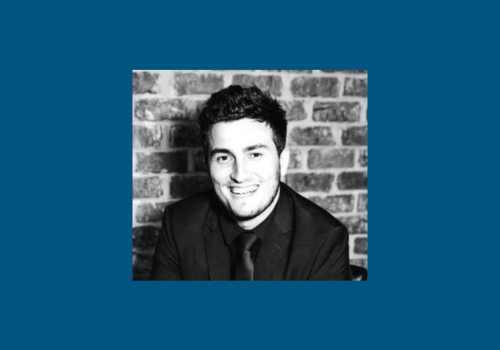
Earning a Good Foundation for Further Success
By Tiffany King

Before Flamur Ramiqi, 27, graduated in May with his bachelor’s degree from the College of Coastal Georgia, he already started a master of advance studies program at the Bern University of Applied Sciences in Switzerland, to build upon the knowledge he gained during his time at the College.
On May 23, Ramiqi graduated with a Bachelor of Science in Criminal Justice with a concentration in cyber defense. Two months earlier, he moved back home to Switzerland with his wife, where he started an internship in the IT department of the International Air Transport Association (IATA) in Geneva and, in April, began the new master of advanced studies in digital forensics and cyber investigation program at Bern University—all before earning his bachelor’s degree. According to Ramiqi, the master of advanced studies (MAS) is a focused degree tailored for working professionals and offers more practical experience.
Ramiqi was born in Kosovo and moved to Switzerland when he was six years old because of the Kosovo War in the late 90s. Three years ago, he came to the United States and, in January 2018, enrolled at the College. Ramiqi wanted to pursue a career in federal law enforcement as an investigator or agent, so the cyber security field was not on his radar—at least not at first.
“I knew it existed, but I thought it was only for people who are geniuses,” he said. He thought cyber security was like how it is portrayed in the movies or on television—someone in front of a computer screen typing a few things and easily finding the missing piece of the puzzle. Ramiqi soon discovered it was much more than that. When selecting a concentration in criminal justice, he realized that having cyber security skills and knowledge would be a great asset to his future career. He compared it to learning a new language.
“I can speak Albanian and I can speak French. I thought that if I could add the IT language of cyber security, there will be more opportunities,” Ramiqi said.
Ramiqi has been putting his acquired skills to good use as an information technology security intern at the International Air Transport Association. The IATA is a trade association of the world’s airlines that supports airline activity and helps formulate industry policy and standards. His internship introduces him to people from all over the world, Ramiqi said, such as Greece, U.S, and England. Ramiqi’s job involves monitoring the association’s network for threats and breaches, and investigating any reports of suspicious activity.
Ramiqi is well into his MAS program at Bern University as he continues to intern at IATA. He is learning fundamental concepts of modern digital forensics; is developing more skills needed to collect and analyze digital evidence from a variety of sources; and preparing to be able to conduct complex cyber investigations. Although most of his classmates are already working in law enforcement and at federal agencies, Ramiqi is well prepared because of his major at the College.
“They (classmates) are really skilled people. I feel really new there, but I’m happy that they accepted me—especially after the concentration I did at Coastal and the certification I earned with Doc St. Clair. That is why I was able to start early,” Ramiqi said.
Dr. Nelbert “Doc” St. Clair is the assistant professor of Cyber Defense and Criminal Justice. He has established partnerships between the College and educational cyber security programs that provide more hands-on learning opportunities, certifications, and cyber competitions. Ramiqi and other cyber security students have already participated in several competitions and are improving their standings with each competition.
In December, Ramiqi passed the Certified Ethical Hacker certification. The certification is obtained by demonstrating knowledge of how to assess the security of computer systems, look for weaknesses, and use the same knowledge and tools as a malicious hacker, but lawfully in a legitimate manner.
“I’m really thankful to Coastal for giving me the starting knowledge of the cyber security field and skills. They allowed me to do labs, competitions, and I learned a lot because of that. It’s really great to have both learning and practice. They gave me a curiosity about this field, and I feel like I learned a lot even though I just started,” he said.
A Community Within a Community
Ramiqi remembers his time at the College fondly. He talked of encouraging his classmates to work hard and he was a big advocate for not only cyber security but also the new data science program, calling them “hot fields right now.” He hopes the College and the Federal Law Enforcement Training Center will continue to grow their relationship and provide opportunities for students to do cyber security and digital forensic work.
“People at Coastal are really friendly and are willing to help and guide you, like TRiO and Ms. Cynthia Atwood (lecturer of criminal justice). My favorite professor was Bryan Lemons (FLETC chief of staff). He was great and always wanted to help me,” Ramiqi said. “What I also liked about Coastal is all the activities they put in place. It felt like a community within a community. The Wesley Foundation was great. I really enjoyed everything they did and working for the (College’s) IT department was good too. I really miss that feeling and the community there.”
Ramiqi hopes to one day see Coastal Georgia students visiting Switzerland, whether through study abroad or a two-week class trip. He is eager to be a guide for students and share his culture the way classmates, professors, and staff shared their lives with him.
